Once again lots of students have been excelling in their remote learning last week and staff were really keen to highlight some superstars for recognition (and 20 reward points) on week 2 of our Praise Wall. A massive well done to everyone who has been listed, we are all very proud of you!
4th May, 2020
The Praise Wall: Week 2, Page 1
Year 10 – Photography
The following students have submitted some stunning photography for their lockdown diary project last week. They were asked to produce moody, monochromatic images representing a more reflective and atmospheric depiction of lockdown, inspired by the photographer Pete Kiehart.
Abby Downing, Ashleigh May, Callum Taylor, Gracie Lowe, Tegan Dalley, Amy Rossington and Zara Bates’s responses are below. Brilliant work, everyone!








Maths - Year 8 & 9
Mr Morris, Leader of Character writes:
I’d love to see my Year 8 and 9 maths students below to be given recognition on the Praise Wall, I think they’d love a bit of praise and deserve it.Year 8: Lillia Brown, Isla Jones, Charlotte Commons and Lucy Willett.Year 9: Jessica Chadwick, Beau Evans, Luke-Lumley Davenport, Georgia Ridings, Subhan Abaid, Kelly Dempsey Fallows, Bronte Naylor and Gizem Hasanova.
Lucas Briggs, Fola Fasehun, Gracie Lowe & Luke Pilling - Maths
Ms Stubbs, Lead Coach writes:
I’m very impressed with my Year 10 maths work. I’ve included a photos of the following student’s work below:
Lucas Briggs, Fola Fasehun, Gracie Lowe and Luke Pilling.
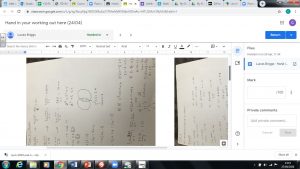
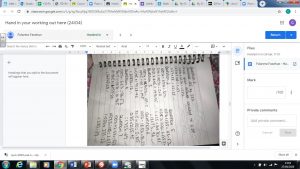
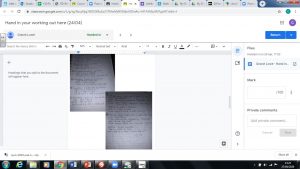
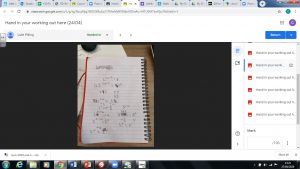
Harrison Evans - English
Mr Lloyd, Leader of Character writes;
Here is a paragraph from Harrison Evans, Year 10 done in English Boost. Please can you add him to the praise wall and publish his work as I think it is top quality!
In the play ‘An Inspector Calls’ (AIC) Priestley uses Sheila to present his ideas of moral growth through her change as a childish, immature, and naive young girl in Act 1 to a woman with her own social views who broke free of patriarchal societal expectations. During Edwardian times, women were expected to be an accessory of her father and husband, and lacked higher education compared to men, being taught only how to manage house staff. This condemned women to a life formed by their fathers and ensured their financial reliance on men. Perhaps Priestley does this to display that women were more than just a possession of the men who surrounded her, and that they needed to learn to break free of the life they were placed into by their fathers and to become more perceptive and question those around them. This progressive, feminist message is illustrated through Priestley’s repeated use of the word “impertinence” within the play. Like the symbol of the engagement ring, Priestley uses it to demonstrate Sheila’s growing independence. Sheila uses her mother’s repeated use of “impertinence” to separate herself from her mother and to criticise her parents’ values because, as Sheila says, it is a “silly” word. The entire idea that someone should be respected more solely due to being born into a higher social class is ridiculous. This, however, is not a message that Sheila understands in Act 1 when she accuses Eva of being impertinent in Milwards in her complaint to the manager. Sheila, however, demonstrates clear moral growth and progress as she moves from being willingly complicit in the absurd Edwardian class system and uses it to have a young woman fired because of Sheila’s own insecurity, to admonishing her mother for being a snob as she questions the morality of the foundations upon which their society is built.
Lily Tinker – Catering
Lily Tinker in Year 8 has been keeping up with her catering and last week has made chicken cordon bleu with oven roast potatoes and carrots. A delicious looking creation, Lily.
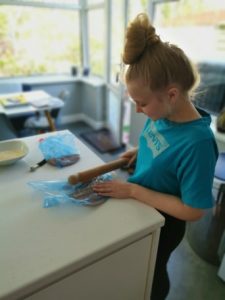
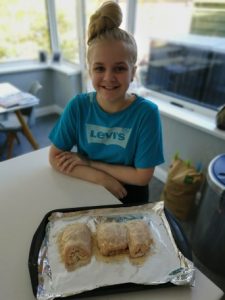


Olivia Dougall – Art
Olivia Dougill in Year 8 has produced this personal piece of artwork at home just for her own enjoyment. We’re very impressed!
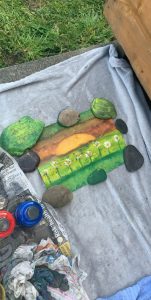
Maths Challenge – Year 7, 8 & 9
Ms Brown, teacher of Maths writes;
Hi everyone, well done to everyone giving the Maths Challenges a go as well as their Maths Remote Learning, great effort! Top 3 for the Week 4 challenges are:
Year 7, 8 and 9 Maths Challenge Top 3:
- Illyaas Sowunmi (9A) and Nathan Blaxall (8R)
- Ellie Mottershead (8T)
- Brianna Knight (7E)
Year 9 Super Challenge Top 3:
- Illyaas Sowunmi (9A) (Again – Very Well Done!!)
- Elliot Knowles (9C)
- Luis Marsden (9T), Lucy Jones (9I) and Spencer Thornley (9I)
Congratulations and well done again to everyone who gave it a go! The Week 5 challenge is now on Google Classrooms for you to have a go at.
Take care a stay safe everyone!
Year 10 English
Mr Lloyd is highly impressed with the work the Year 10 students listed below have produced on their Macbeth assignments last week. Well done, everyone!
Caitlin Rhead, Callum Parkinson, Bella Thompson, Lucy Naisbitt, Luke Partington and Molly Gunn.
Abby Butterworth & Branigan Goodwin-Sheridan - Maths
Mr Barry and Mr Stanley are delighted with the work that has been uploaded last week by Year 10 students Abby Butterworth and Branigan Goodwin-Sheridan. Well done and please keep it up!
Lewis Hales - Science
Mr Harte wants to recognise Lewis Hales in Year 10 as being the first to complete all his assignments and has actually messaged him with specific areas he would like more work for and help with. Lewis stands out as really engaging well with the remote learning from home. Well done, Lewis.
Keira Howard – Music
Mr Poole would like to praise Keira Howard in Year 10 for her efforts in her music home learning. She is nailing her work each week, and sending in detailed notes of everything she is doing. By far music’s best worker!
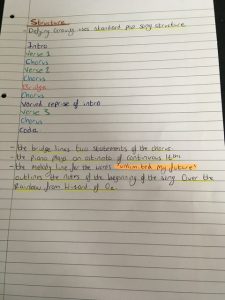
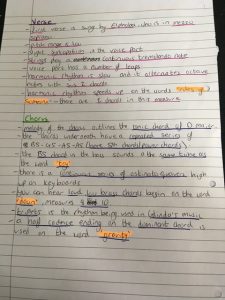
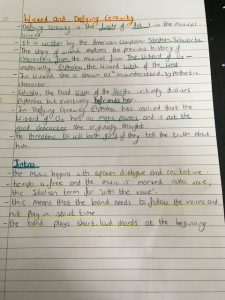
Catering
Students and families have been sending in images of the dishes they have been making at home, both for their catering remote learning tasks and for their own pleasure. Ms Ward, Leader of Technology wanted to say a big well done to all of you who have been cooking at home and practicing your Catering skills. We love to see pictures of what you’ve been making. If you haven’t already, take a look at the videos I’ve been posting with ideas for things to cook.
Congratulations to the following for cooking the delicious food in the collage.
Keira Gallacher, Ella Morley, Leon Tennant, Alisha Makin, Cameron Purdie, Jenna Kennedy, Lily Phillips, Lucy Edwards, Ellis Harrison-Scott, Jessica Leighton and Jessica Murphy.

Year 10 – Geography
Mr Foulkes would like to highlight praise for the following students who have stuck with our rigorous Acquire, Apply, Assess model last week on the topic of Hard Engineering Flood Defences and achieved some outstanding results. He has included a Gold Standard answer from Codey Rule which shows good understanding of new subject material.
Practice Question: To what extent are hard engineering schemes sustainable?
(This is asking your opinion on whether hard engineered flood defences are worth it in terms of costs and their effectiveness and also whether we can carry on adding hard defences into the future – think about coastal retreat when we studied coasts, would river retreat be better)
I think that hard engineering schemes are sustainable to an extent, factoring in the effects that they have in the immediate vicinity and also later downstream. For example, river straightening is fantastic at reducing the risk of flooding in that particular area, however, the increased speed of the current may cause greater [flash] flooding risk not too far down the line. This makes it sustainable but [only] to an extent. Another example would be embankments. They are great at keeping water flowing but due to the faster current that they make it causes increased risk of flood elsewhere [as well as the increased flow provides a greater volume of floodwater]. Dams and reservoirs are very effective at regulating and controlling the flow of the current. However they may also cause floods and displace people due to destruction of area / property. In conclusion, I am led to believe that hard engineering is more of a ‘double edged sword’ than a permanent solution and most of them reduce problems in that area however cause problems for other areas by doing so. This is not sustainable.
Other students who have produced some brilliant responses are:
Cameron Purdie, Charlie Allwood, Charlie Wilson, Elina Velicka, Ella Scweitzer, Haider Rehan, Hannah Slater, Leah Bentham, Leah Lewis, Olivia Vining, Ryeleah Cartwright, Shazaib Aslam and Sol Love.
Well done, everyone!
Year 10 – MFL
Ms Fowler would like to praise Halle Bates-Robertson, Gracie Lowe, Molly Gunn in Spanish and Megan Baxendale in French.
These students consistently go above and beyond every week. They are handing in quality work and they continue to develop their skills and use feedback constructively and use feedback to make improvements. These students are a real credit to the MFL department!
Ellis Harrison-Scott – Design Technology
Ms Ward is very impressed with the excellent quality of work and effort of Ellis Harrison-Scott in Year 8. Well done, Ellis!
Year 10 – Digital Information Technology
Ms Givens would like to say a massive well done to the 14 students from 10B DIT class who completed the online Kahoot Low Stakes Quiz last week. In particular, well done to the students below for coming in the top 5 with brilliant scores. Keep it up!
Liam Doran, Samantha Bithell, Aaron Purdie, Bettina Babic and Lucas Briggs.
